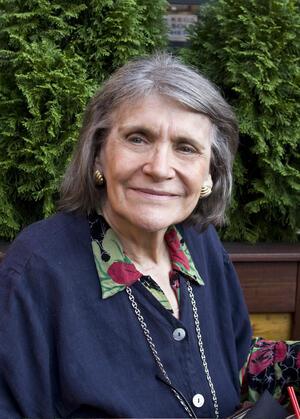Barbara Seaman
A pioneering health feminist, author, and central figure in the second wave of the women’s movement, Barbara Seaman was best known for her opposition to mass-prescribed hormones, including diethylstilbestrol, estrogen replacement therapy, and the high-dose birth control pill. Her first book, The Doctors’ Case Against the Pill (1969), provoked Senate hearings on pill safety. Her efforts forced pharmaceutical companies to provide written disclosures of any possible side effects in each pill packet, the first mandate of its kind. Seaman was an architect of the “feminist health movement,” which advocated informed consent and patient rights at a time when men (doctors, husbands, legislators, and religious leaders) made decisions about women’s bodies.
Barbara describes her current scholarship, an article for Oprah Magazine, about new research into the harmful effects of preventative hysterectomies. She relates this to the work of Rose Kushner, who wrote and researched breast cancer and the effects of mastectomies. Barbara then discusses her maternal great-great-grandmother, who died at the age of 102 while undergoing an elected hysterectomy, and details her family history. She describes her admiration for the strong women on both sides of her family. Barbara explains how gender and her parents’ socialism shaped her life experience; she believes that because her father had a twin sister, that made him a good father to girls. She attended Oberlin College, one of the few institutions that didn’t sign a loyalty oath during the McCarthy years. Barbara was active in civil disobedience and dissent during her college years. She organized the folk music club at Oberlin and invited Pete Seeger to sing there. Years later, Seeger told her that it had been a significant experience, as he had just been released from jail and was struggling to find work and support. Barbara recounts her involvement in the women’s movement and her work as a writer and journalist. She talks about her first article about subverting breastfeeding practices in hospitals. The publication of that article generated an enormous response for readers, and Barbara realized that women were getting angry about doctors’ harmful interventions in women’s health issues. She describes the transformative moment of encountering Alice Jacoby Wolfson at the Pill Hearings in Washington, D.C., and being inspired by her activism and willingness to be confrontational with male health professionals, and to a change in her writing style, from a respectful “women’s magazine style” to a “critical insider” stance. Finally, she discusses how the pharmaceutical industry has retaliated against her reporting and emphasizes that activist journalists must be aware of the power of oligarchic corporations and their control over the press.



